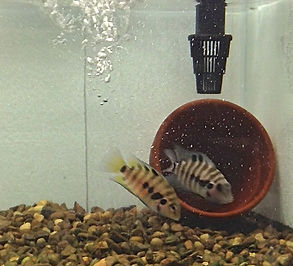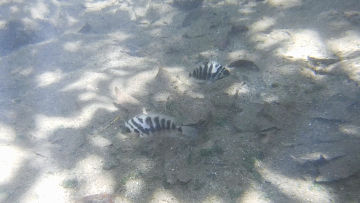Convict cichlids
This freshwater species is a biparental species found mainly Costa Rica and Nicaragua. They engage in serial monogamy (parents raise their brood together to independence, then find a different mate to raise another brood). In addition to monogamy (a rare trait in fish), males and females have specific parental duties; males are more defensive and patrol, while females are more involved in more direct care role (like aerating eggs and feeding fry).
Most of our work has focused on how individuals choose mates as well as the coordination and choice of various parental roles. Recent projects have also included exploring the hormonal basis behind these behaviors.


Behavior projects
Mate choice: Previous discoveries include that when males and females are choosing mates, males show their preferences through courtship behaviors, while females show their preferences through time spent. However, when competing for mates, both sexes show preferences through time spent suggesting males alter their behavior to engage in mate guarding behaviors. In addition, males who females select as mates show less vigorous courtship than males who are rejected.
Parental care: Though parents have sex typical roles, they can switch these when needed, however mostly they coordinate their duties to remain in their preferred roles. I have studied what determines this preference; once in a role, males appear less flexible than females, and aggression between parents is partly responsible for the observed division of roles. Also we have shown that the breeding experience of a partner effects the parental behavior choices of the other partner.
Adoption and Fry choice behavior: We have also shown the aggression parents show is not only to deter fry predators, but to also deter fry from other pairs from joining their brood. Parents will adopt foreign fry when they are it is beneficial, but some instances, like when foreign fry are larger than their fry, this is costly. Therefore, parental recognition of any fry they care for appears based only on size and not necessarily relatedness. When given a choice, fry do not preferentially go to their own parents, but rather choose any parent who shows affiliative behaviors towards them.
parental convict cichlids tending a nest in lab
parental convict cichlids tending fry in a Costa Rican river

male (front) and female (back) defending nest from stranger behind a translucent barrier
Neuropeptide modulation of behavior
In an attempt to understand the physiological modulation of behavior my lab explores the neuropeptide arginine vasotocin (AVT) as it, and its mammalian homologue arginine vasopressin (AVP), has been shown to regulate multiple mating and aggressive behaviors across species. I am interested in how this neuropeptide has evolved through different species and different mating systems to appropriately modulate behaviors. That is, many studies show that while AVT / AVP do modulate these behaviors in most vertebrates, it does so differently based on species and context. We know in convict cichlids the AVT neural phenotype changes in both sexes as they change from single to paired, but these changes are sex specific. At present, we are exploring the behavioral ramifications of these neural changes
AVT neurons stained in a pre-optic area of convict cichlid male brain
